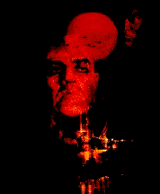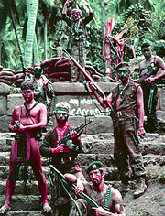 |
Set in the late stages of the Vietnam conflict, Francis Ford Coppola's
1979 film Apocalypse Now details a US unit's suicide mission deep
behind enemy lines, an allegorical journey into the darkness of their
own hearts. The loosely structured narrative of the film captures the
viewer up in an imagistic stream of consciousness, a paranoid delerium
played out in the heart of a brutal conflict. In the 1990s a similar
apocalyptic battlefield aesthetic has emerged in the music and culture
of jungle and drum and bass. Set in an Apocalypse Now style hallucinogenic
warzone, the mood of jungle hardcore is one of militant individualism.
In his article Wargasm (Frieze, May 1996) Simon Reynolds traces jungle's
militarism back to the early days of hardcore rave. From camouflage patterned
album sleeves and dance clothing to metaphors of the DJ as artillery-man, Reynolds
claims that jungle is saturated with warzone imagery. With sub-sonic landmine
bass, and sped up breakbeats exploding like bursts of machine gun fire, the atmosphere
of jungle is over-archingly militaristic. The coloured smoke and stroboscopic
lighting recall the hallucinogenic fire fights and dawn raids of Coppola's Apocalypse
Now.

Immersed in this cinematic soundscape the junglist plays the role of
the more improvisatory, less regimented soldier that Reynolds suggests
will be required
for the conflicts of the future - the rogue trooper. Like a one-man-army, hardstepping
jungle dancers appear to be fending off invisible enemies with their shadow-boxing
style, a barrage of calculated chops and slices. Sensing the constant presence
of a hidden enemy, like a conspiracy theorist the junglist is adrift in a paranoid
atmosphere of foreboding. Located within the context of late capitalism, the
lyrical samples of drum and bass tracks often hint at the omnipotent presence
of faceless conspiratorial cabals: "Propaganda. . . They believe in propaganda," "The
shadow cast over society by big business."
While Neville Wakefield finds in jungle's forerunner acid house a corollary for
Baudrillard's theories of obscenity, a space where there are no secrets, for
the junglist hidden agendas abound. However, unlike conventional conspiracy theory,
which usually betrays a linear worldview based on discovering the Truth, jungle
corresponds more closely to a rhizomatic formation, its half whispered secrets
avoiding any orientation toward resolution or culmination.
Perhaps the imagined presence of jungle's massive veiled Other can be understood
in relation to its ongoing fascination with the interface between Eastern and
Western cultural production. Western in origin, jungle looks to the East (as
well as Wu Tang's East Coast) for inspiration, to Akira's neo-Tokyo of
the future (see No U Turn record's Torque compilation), to the US military
intervention of recent decades, particularly the Vietnam conflict, and to the
feudal law of ancient Japan. Filtered through the lens of Western experience,
this exoticism of the East is inextricably linked to popular visions of the primitive.
In Apocalypse Now Marlon Brando plays Kurtz, a US colonel turned renegade,
waging his own private war deep in the Cambodian jungle. Journeying deeper and
deeper into a metaphorical primal past, both Kurtz and his would-be assassinator
Willard walk the fine line between revelation and madness. In Apocalypse Now to "go
native" is, ultimately, to go insane.

A similar correlation between primitivism and danger can be identified in the
menacing atmospherics of drum and bass. In this sense, to speak of the ominous
tunes that currently rule over the jungle scene as `darker' than their forerunners
is a telling turn of phrase. It might refer not only to the menacing quality
of these tracks, but also to their relative `blackness,' and perhaps these two
features are not entirely unrelated, for jungle is at once drawn to and repulsed
by the spectre of otherness, be it the guerrilla tactics of Viet Cong soldiers,
the alien technologies of Japanese manga, or the urban gangsterism of black US
youths. Embodying a simultaneous identification and dread, the music is an exoticising
tourism of Western culture's suppressed and negative counterparts: blackness,
primativism, madness, nature, the feminine.
Formulating a hyper-individualistic masculinized defence, during their
night
out the jungle raver braves a perversely pleasurable journey to the "heart
of darkness" (the name of the novel on which Apocalypse is loosely based).
Ultimately though, like a GI doing their tour of duty the junglist is only a
visitor here, their encounter with debased difference a confirmation of their
own civility. In Apocalypse Now, and again in Tonic's 1996 track Renegade
Fazed, the desire is expressed to "go out like a soldier, standing up,
not like some rag-assed renegade."
Jonathan Nicol
|
 |